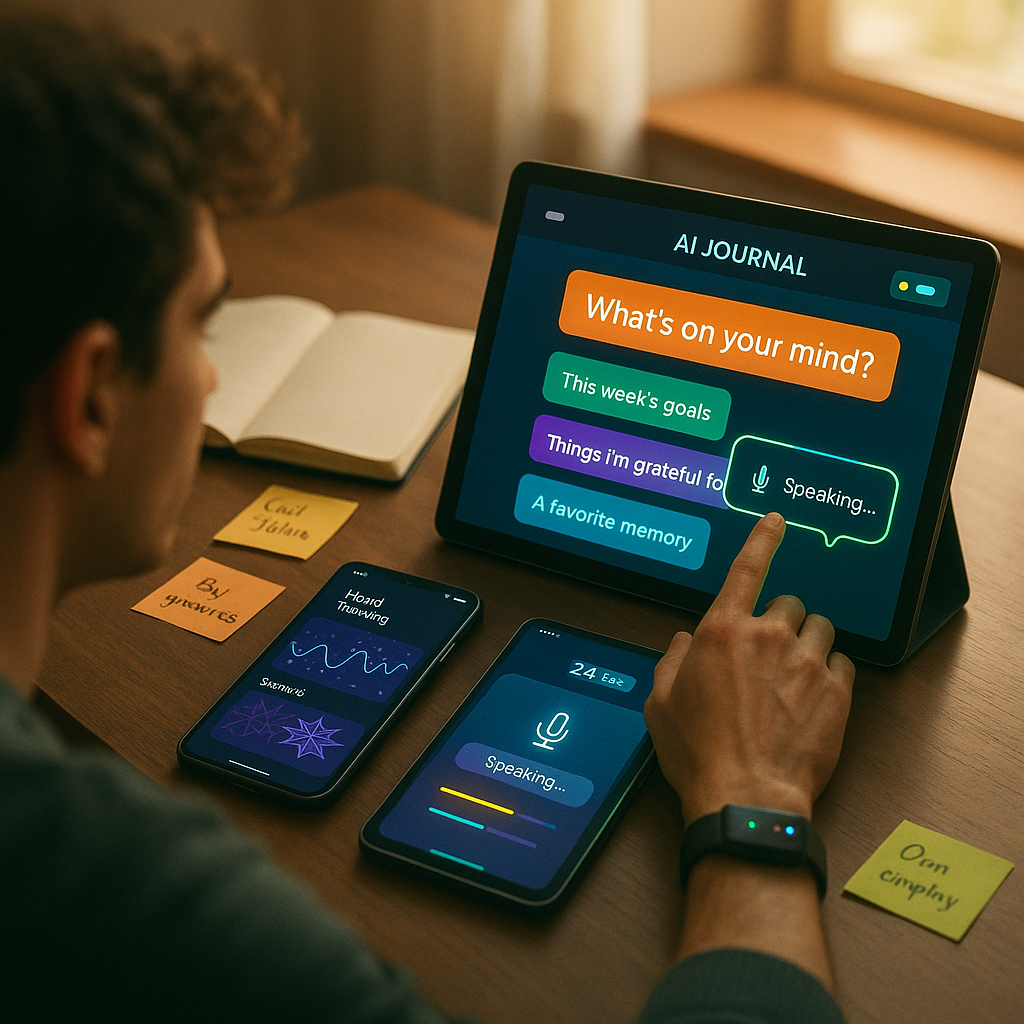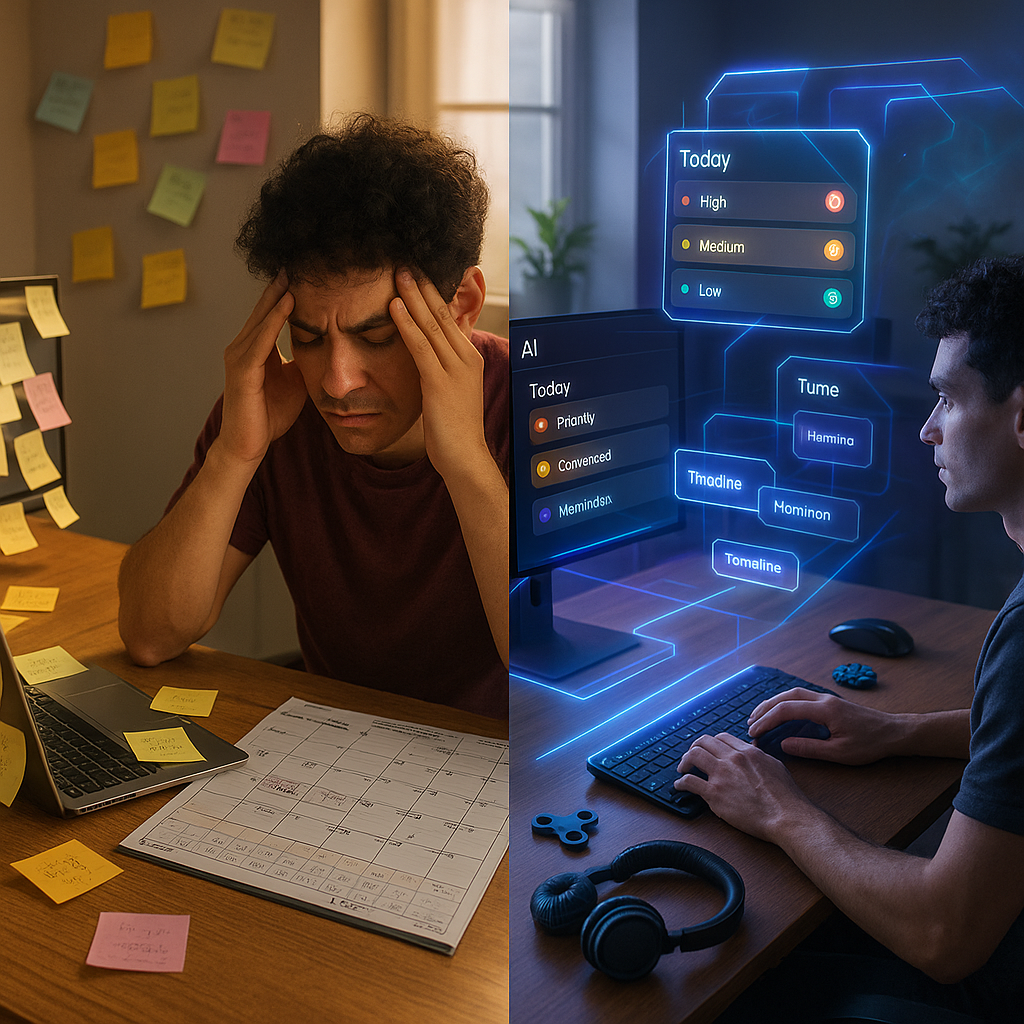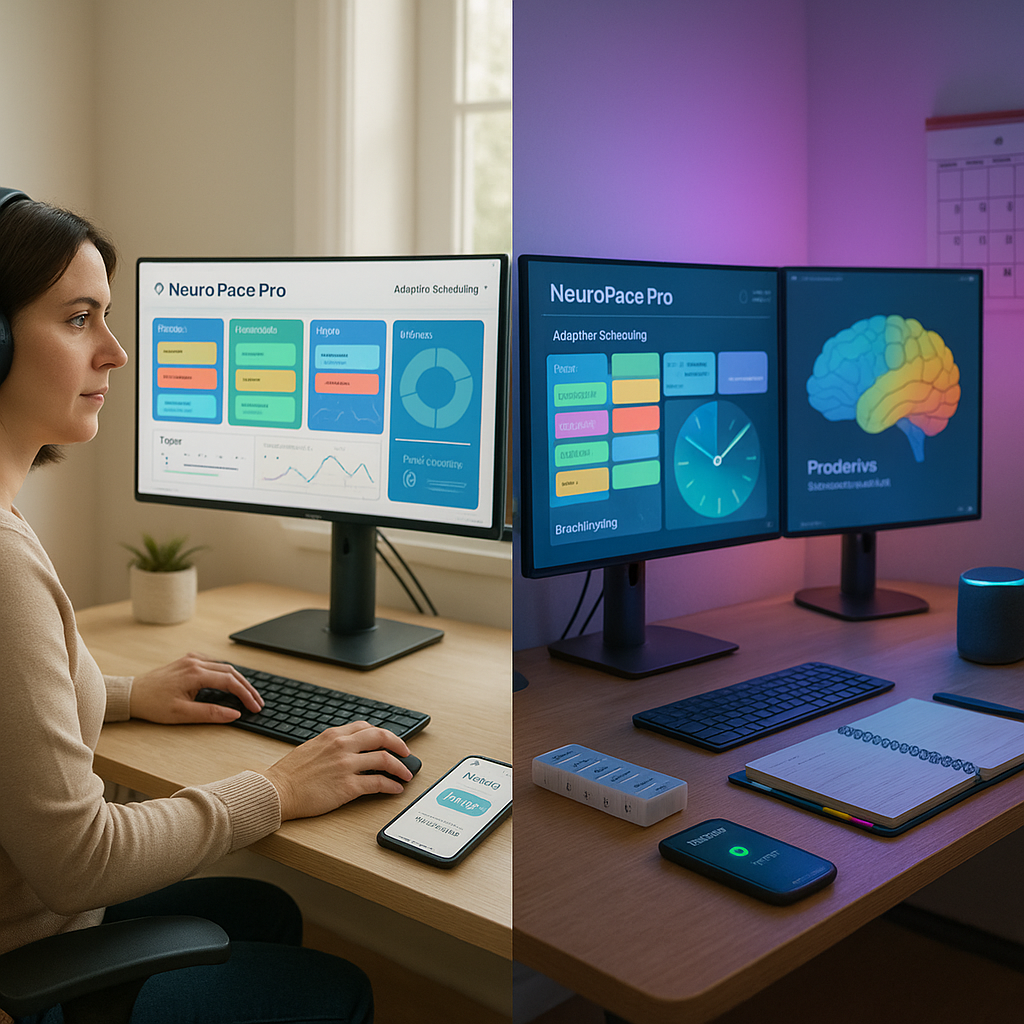Key Takeaways
-
Automated prompts disrupt the initiation struggle. By delivering tailored reminders, thoughtful questions, and gentle encouragement at strategic times, AI-powered systems remove the burden of remembering to journal. This directly tackles one of ADHD’s biggest barriers and makes starting the process effortless.
-
Generative AI designs reflection for your unique wiring. Rather than relying on generic check-ins, AI-driven tools craft prompts that resonate with your individual language and style. These prompts spark engagement and help gently guide you past mental blocks that are particularly challenging for ADHD brains.
-
Seamless systems mean “set it and forget it” reflection. Through smart automation, reminders are scheduled, entries organized, and insightful patterns surfaced without tedious manual effort. This allows reflection to flow naturally without getting tangled up in administrative details.
-
Pattern recognition reveals hidden progress. Advanced AI does more than just store your journal entries. It analyzes them for trends in mood, behavior, habits, and executive functioning. This analysis unveils breakthroughs and provides ADHD-specific feedback that fuels both insight and growth.
-
Consistent cadence without relying on willpower. Automated journaling tools help embed reflection into your daily rhythm. Once set up, the process sidesteps the ups and downs of motivation, making it much easier to build a consistent, sustainable practice.
-
Integrated support amplifies other ADHD strategies. AI journaling can sync with task managers, calendars, or ADHD coaching routines. This integration transforms journaling from a siloed activity into a vital part of your broader self-management toolkit.
For ADHDers, journaling no longer has to be another source of frustration or another system destined to fail. By leveraging automation, AI, and neurodivergent-friendly design, you can make meaningful insights stick and transform reflection into a supportive anchor in your routine. Now, let’s dive into the practical steps, top tools, and real-world stories that will empower you to create your own effortless journaling system.
Introduction
Journaling is widely promoted as a path to self-awareness, personal growth, and peace of mind. However, for many people with ADHD, even the first step (getting started) can quickly spiral into overwhelm. Task initiation difficulties, forgetfulness, and the elusive nature of routine make it challenging to build a consistent reflection habit.
This is where AI journaling for ADHD comes in. By blending generative AI, automation, and ADHD-friendly design, these modern tools transform scattered intentions into a steady, supportive system. Tasks like reminders are taken off your plate, prompts are personalized to match your unique thinking patterns, and hidden progress is surfaced for you. It makes self-reflection attainable without battling your own brain.
With this foundation, let’s explore how you can set up an effortless journaling system that adapts to your specific needs and supports reflection as a positive, sustainable habit.
Understanding ADHD and the Challenge of Consistent Journaling
The intersection of ADHD and journaling brings a distinct set of challenges, largely shaped by executive function differences that can make jotting down thoughts feel like climbing a mountain in flip-flops. While well-intentioned advice often suggests “just write for 10 minutes every day,” this fails to account for the hurdles ADHD individuals face daily.
Executive Function Barriers to Journaling
Task initiation often stands as the first and highest wall. The sight of a blank journal page can provoke “blank page paralysis,” where infinite possibilities lead to instant decision fatigue. Time blindness adds another layer, making it harder to maintain regular journaling habits even on enthusiastic days.
Other frequent executive function challenges include:
- Working Memory Issues: Difficulty retaining thoughts long enough to write them down
- Emotional Regulation: Apprehension about reflecting on difficult experiences
- Organization: Struggles with maintaining a structured journaling routine
- Task Switching: Hardship in transitioning from current activities to journaling
These barriers show why even the simplest journaling routines often slip out of reach for many with ADHD.
The Traditional Journaling Paradox
Typical journaling advice unintentionally creates a frustrating paradox. The very act that could help process and organize thoughts requires the exact executive functioning skills that ADHD frequently undermines. As a result, people often experience:
- Inconsistent entries, creating large gaps in reflection
- Abandoned journals and the shame that often accompanies them
- Perfectionism, which halts authentic self-expression
- Reluctance to restart journaling due to memories of past “failures”
Why Traditional Solutions Fall Short
Common journaling methods usually miss ADHD-specific needs, such as:
- Dynamic Structure: Fixed prompts turn repetitive, but too much freedom feels overwhelming
- Initiation Support: Most systems lack features that make starting easier
- Flexibility: Traditional systems don’t adjust to fluctuating attention spans and energy levels
- Immediate Reward: The benefits of regular journaling often feel too delayed to spark lasting motivation for ADHDers
Acknowledging these obstacles sets the stage for a technological solution. Using AI to redesign journaling as a tool that truly works for neurodivergent minds makes it more accessible and effective across the board.
The AI Advantage: How Technology Transforms ADHD Journaling
Recognizing that traditional journaling systems don’t always fit, AI-powered solutions offer a game-changing alternative. Technology can bridge the gap between intention and action, giving ADHD individuals actionable tools that play to their strengths.
Automated Intelligence as Executive Function Support
AI serves as an external executive function assistant, providing structure and support for the areas where ADHD brains might struggle to self-manage. With cutting-edge technology, today’s AI tools can:
- Generate and refresh personalized prompts using your previous entries for maximum resonance
- Adjust interactions and reminders according to your current mood, energy, or interests
- Offer encouragement and gentle nudges tailored to your needs
- Automate reminders so you don’t have to depend solely on memory or willpower
Key Benefits of AI-Enhanced Journaling
Bringing AI into your journaling routine opens up advantages that make reflection easier and more rewarding:
- Lower Cognitive Load: AI handles organization and prompt curation, freeing you to focus on actual reflection
- Novelty and Engagement: AI can introduce new, relevant prompts to avoid monotony and maintain interest
- Deep Pattern Recognition: AI effortlessly detects and surfaces recurring themes and trends, offering new insights
- Accessibility for All Learning Styles: With voice-to-text, image uploads, and flexible input, capturing thoughts becomes much easier, no matter your preferred style
Tackling ADHD-Specific Journaling Challenges
AI tools are uniquely suited to overcome the core obstacles that often derail traditional journaling habits for ADHD individuals.
- To Address Initiation Issues: Contextual, timely prompts make starting less daunting
- For Building Consistency: Intelligent, adaptive reminders fit your life rather than disrupt it
- To Maintain Focus: Structured yet flexible sessions keep you on track without feeling constricted
- In Facing Perfectionism: Instant feedback and tolerance for “messy” inputs lower the bar, encouraging authentic self-expression
AI doesn’t just replicate the old journal-in-a-notebook model. Instead, it redesigns the experience from the ground up to empower those with ADHD, foster executive function, and make self-reflection a genuinely rewarding habit.
This technology-driven shift isn’t limited to personal development. AI-powered journaling has valuable parallels across industries including healthcare (where reflective tracking supports mental health interventions), education (facilitating personalized learning reflections), and even corporate environments (enhancing employee wellness and productivity programs). As AI continues to evolve, its capacity to support neurodivergent minds (both individually and in broader social structures) will only deepen.
Conclusion
Journaling has long been heralded as a key to greater self-awareness and growth, yet for the ADHD community, standard approaches often feel more like endurance challenges than genuine opportunities for transformation. By shedding light on the unique executive function barriers (blank page paralysis, time blindness, and inconsistency), we see clearly why conventional journaling often fails to stick for neurodivergent individuals.
AI-enhanced journaling offers a new path. One that meets ADHD brains where they are. Personalized prompts, responsive structure, and supportive reminders create a system that adapts to your mind, encouraging reflection without overwhelm or shame. With these tools, even those who have struggled with abandoned journals or “failed” systems can finally make reflection a sustainable part of their daily rhythm.
Looking forward, businesses and individuals alike will benefit from embracing this adaptive, tech-powered approach. Whether journaling for personal growth, enhancing workplace wellness, or supporting students in educational settings, those who adopt AI-enhanced systems now will be positioned at the forefront of self-development and mental well-being. The true opportunity for neurodivergent minds and for anyone seeking daily clarity lies not just in adopting new tools, but in choosing tools that evolve with you. The next era belongs to those who transform their challenges into strategic advantages, turning reflection from a struggle into a source of steady brilliance.





Leave a Reply